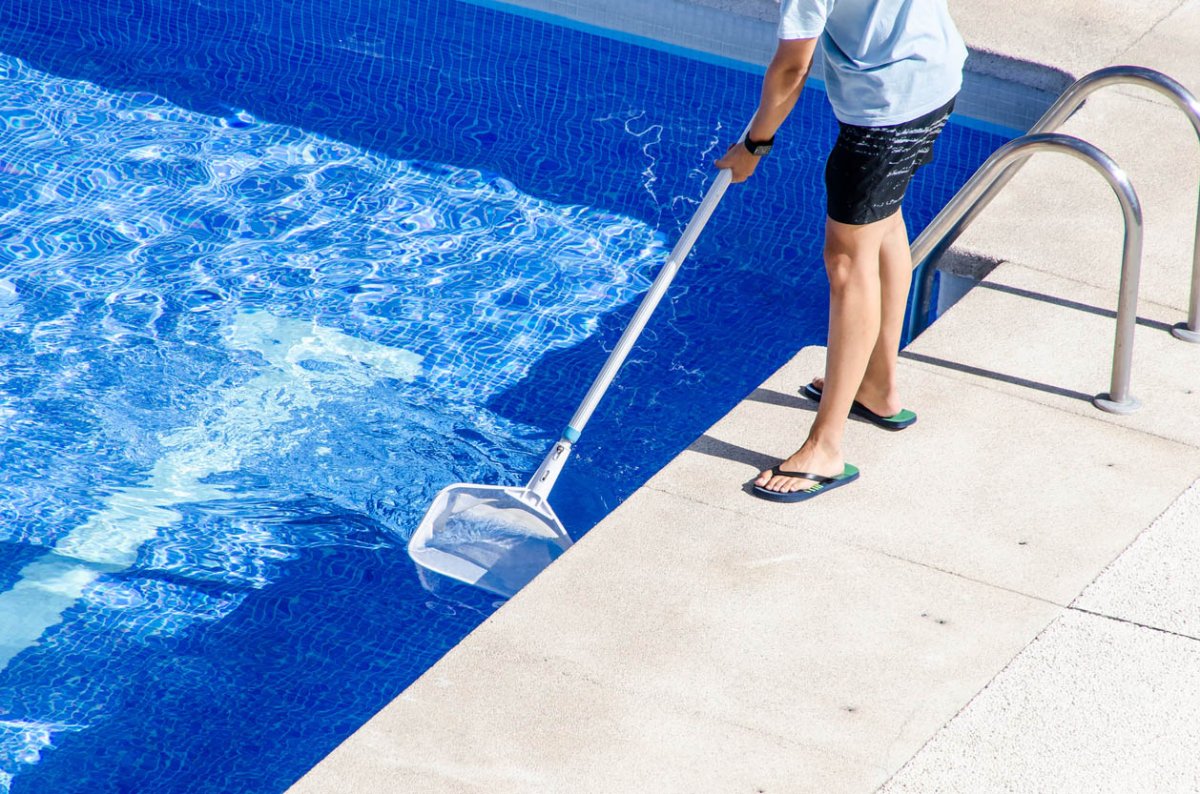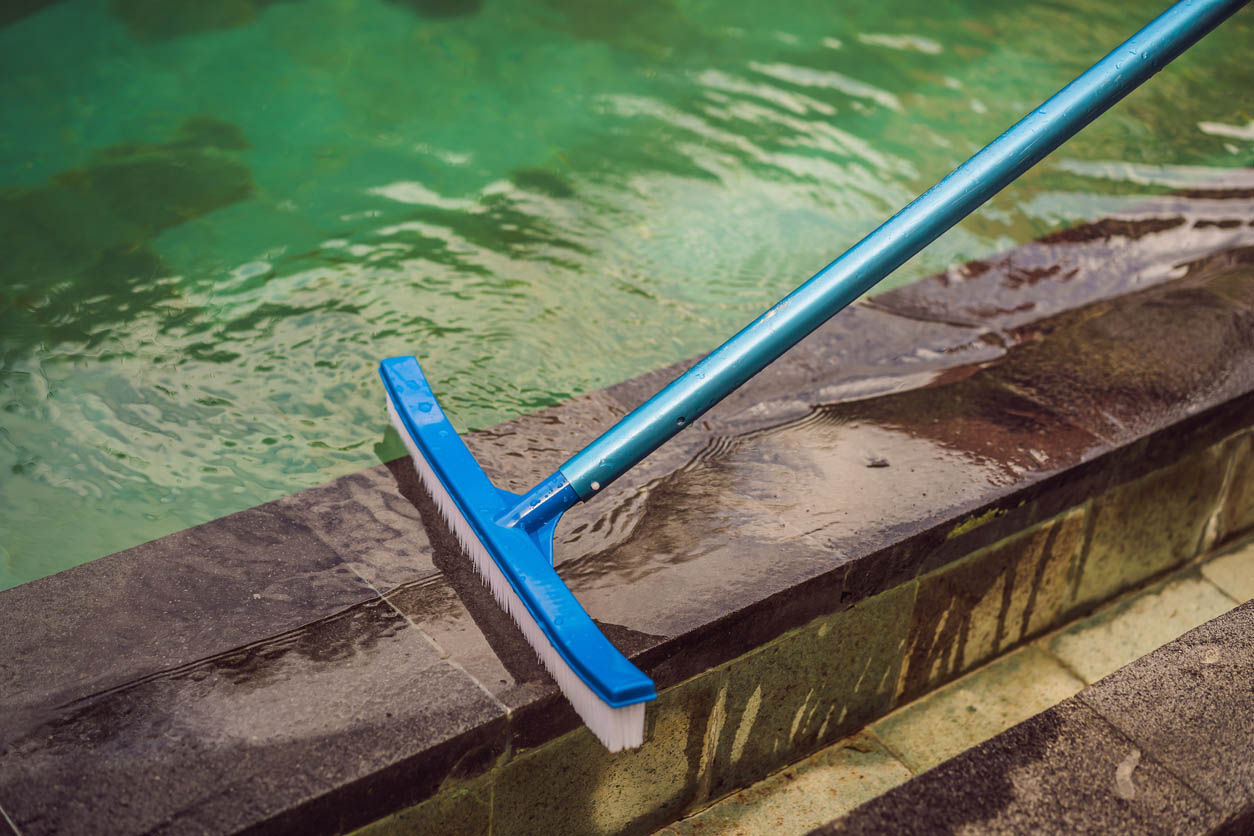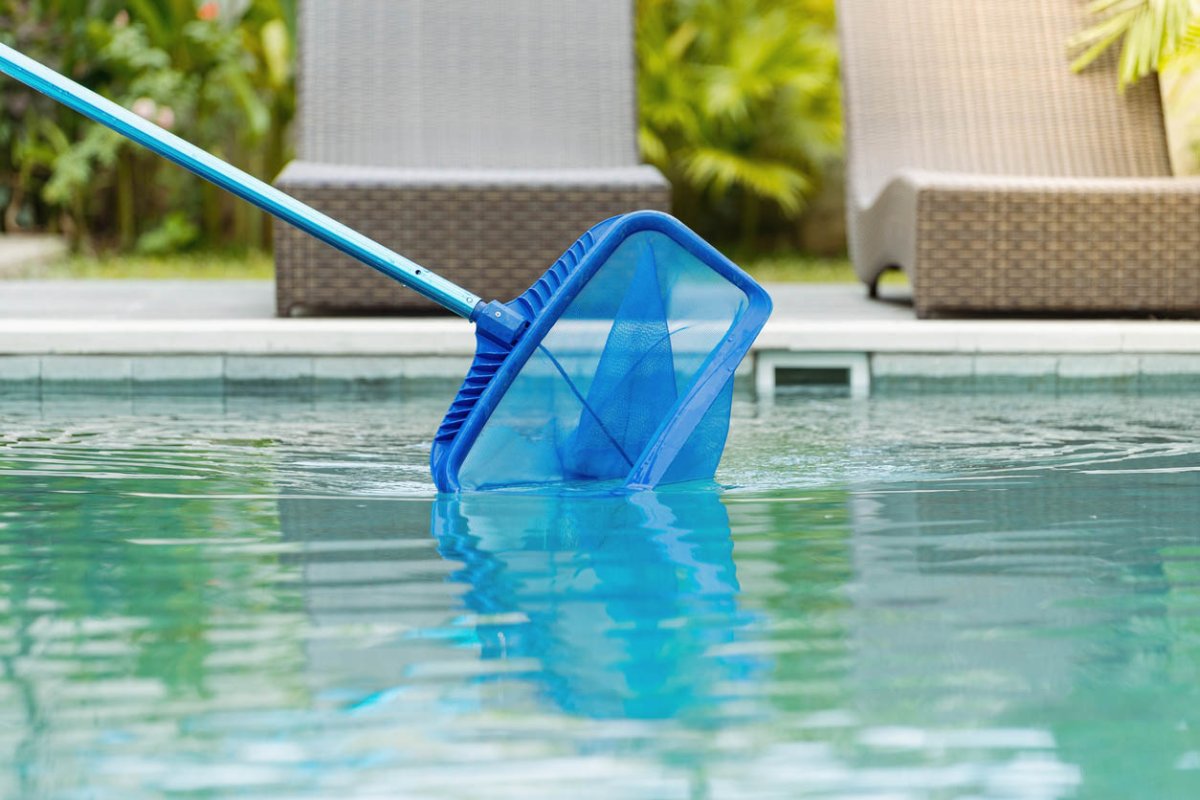We may earn revenue from the products available on this page and participate in affiliate programs. Learn More ›
Project Overview
- Routine pool maintenance involves removing debris from the water’s surface, brushing the pool to remove sediment, vacuuming the pool, adjusting the water’s chemicals, and cleaning the filter and skimmer basket.
- With enough time and experience, a homeowner can perform these pool maintenance tasks themselves to save money.
- Hiring a pool maintenance service may be a better option for busy homeowners or those who aren’t confident they can maintain their pool themselves.
Enjoying a cool dip in the backyard swimming pool is the ultimate reward after a long day. The last thing anyone wants is to jump into murky pool water with a foul odor. While easier than learning how to build a pool from scratch, keeping a pool clean and clear takes more than just tossing a few chemicals into the pool every once in a while. Balancing the pH, skimming debris from the surface, and performing shock treatments are just a few tasks pool owners need to do regularly. To avoid stepping outside and wondering, “Why is my pool cloudy?” homeowners will want to follow these steps for how to maintain a pool so it can be enjoyed anytime.
Time required: 30 minutes to 24 hours
Difficulty: Beginner to intermediate
Estimated cost: $60 to $150
Tools & Materials
Bobvila.com may earn a commission from purchases made through these links.
- Gloves
- Safety glasses
- Nonslip shoes
- Long-handled skimmer net
- Pool brush with long handle attachment
- Pool vacuum
- Filter cleaner (optional)
- Tennis balls (optional)
- pH test kit
- Chlorine test kit
- pH balancer
- Sanitizer (chlorine, bromine, or salt)
- Shock treatment
- Algaecide
Before You Begin…

DIY pool maintenance can be tricky and involves keeping chemicals properly balanced and preventing murky or algae-filled water. Microscopic elements blow into the pool, trees drop pollen and leaves, storms bring heavy rains, humans introduce oils, and frogs or birds enjoy taking a dip in the pool. All of these situations can quickly alter the pH level or chemical balance of a pool. Without the proper testing kits or tools to clean the pool, it can be challenging to identify how to maintain the pool and how to raise pH in the pool to bring back clean water. Additionally, broken pumps or filters will need to be repaired or replaced by pool service companies to get the pool back on track.
Tips for Maintaining a Pool
- Establish daily, weekly, monthly, and yearly schedules for cleaning or treating the pool and replacing old parts.
- Keep all chemicals on hand so you can quickly treat a problem.
- Run the pool filter for at least 8 hours each day to keep the water circulating and prevent algae buildup.
- Clean the filter twice a year and replace it every 1 or 2 years.
Safety Considerations
- Use gloves and safety glasses when handling pool chemicals to avoid skin irritation.
- Wear nonslip shoes when cleaning the pool to avoid accidentally falling in.
- Adhere to pool chemical dosage recommendations to prevent skin burns in the pool.
- Store chemicals according to manufacturers’ recommendations.
- Avoid mixing pool, spa, and household chemicals.
STEP 1: Get rid of debris from the water’s surface and the filter.
Skimming debris from the pool is the most straightforward and frequent task for inground or above-ground pool maintenance. Fallen leaves, dead insects, and even living creatures are often found in pools but are relatively easy to remove with a long-handled skimmer net. In some cases, the filter may have sucked in debris, which means the filter will need to be opened to remove the debris. As a rule of thumb, homeowners will want to keep the pool’s water level around half the height of the skimmer so that debris can easily float inside. It’s a good idea for the homeowner to make sure the filter is not operating during regular pool cleaning.

STEP 2: Brush the sides of the pool to remove algae and sediment.
If a homeowner is wondering, “Why is my pool green?” the answer is that there is probably an algae buildup problem. Despite efforts to keep the pump running often enough, scum, algae, and sediment will build up on the edges of a vinyl or concrete pool. On the upper edges of the pool, homeowners can use a pool brush to clean off any sediment or chemical buildup that may occur. With the long handle attached to the brush, homeowners will want to reach down into the bottom of the pool and scrub any dirty or scummy spots. It’s important that a homeowner complete this step before doing any testing or chemical treatments.
STEP 3: Vacuum the pool.
About once a week—or after a heavy storm or wild party—pool owners may notice a lot of debris settled on the bottom of the pool that the skimmer can’t get. That’s when it’s time to haul out the pool vacuum. There are manual vacuums available that pull out water and debris from the pool. The best robotic vacuums automatically clean the pool, and suction vacuums work with the filtration system to collect debris into the built-in skimmer basket. The best pool vacuums will reduce the amount of water in the pool, so water will need to be added beforehand to keep the water at the appropriate level. Or homeowners can avoid the weekly hassle of hauling out a pool vacuum altogether by using one of the best pool cleaning services.
STEP 4: Test the water and adjust chemical amounts.
Now that most of the debris is removed and the walls are free from scum and sediment, it’s time for the homeowner to test the water’s pH balance and chemical content. The following are the ideal ranges a pool service company would test for:
- pH between 7.2 and 7.6
- Alkalinity between 100 and 150 ppm (parts per million)
- Free chlorine between 1.0 and 3.0 ppm
Homeowners can use a pH balancer to adjust pH levels to maintain the appropriate range. They can add sanitizer or a chlorine shock treatment per the pool manufacturer’s recommendation. In hot, humid climates, adding a small amount of algaecide each week can prevent a buildup. All of this can be an intimidating part of pool maintenance for beginners, so some homeowners prefer to let a swimming pool maintenance service handle this task for them. If the pool was put in by one of the best pool installation companies, maintenance services may be included.

STEP 5: Backwash the filter and clean the pump filter.
Backwashing a filter is a regular task that helps push all the built-up sediments out through the waste line and drain, so they don’t remain in the filter. There are three main types of pool filter: cartridge, diatomaceous earth, and sand. Each of these will need to be backwashed as often as the filter reads 8 to 10 psi (pounds per square inch) higher than usual. That’s an indication that significant buildup has occurred and needs to be flushed. If the pump filter looks dirty, homeowners can use a filter cleaner to remove the scum or replace it. A cartridge filter will need to be replaced every 3 to 5 years, diatomaceous earth filters should be replaced annually, and a sand filter must be replaced every 5 years.
STEP 6: Clean the skimmer basket.
A pool’s skimmer catches any fallen leaves, bugs, or even small animals that make their way into the pool and collects them in the skimmer basket. The skimmer basket will need to be cleaned at least once a week to prevent clogs, which can significantly reduce the lifespan of the pump. Since frequent pump replacement is an unwelcome and unexpected inground pool cost, it’s an issue that can be avoided by taking care of regular maintenance. The first step is for the homeowner to turn off the pump. Then, they’ll lift the skimmer lid and pull out the skimmer basket. Finally, they’ll empty the basket and rinse it if necessary, then place it back into the skimmer. Some pool owners add a couple of tennis balls to their skimmer basket to absorb oils for a more complete clean.
STEP 7: Call a professional if you encounter any issues or are unsure about how to maintain a pool.
Getting the proper chemical balance when the pool has gone green or murky isn’t always an easy process. If too many chemicals are added, the pool may need to be partially drained and refilled to restore safe levels. A pool that is used regularly needs more maintenance than pools used once a week or less. These are all tasks that a pool service company is more than willing to handle to alleviate the burden of DIY swimming pool maintenance.
Regular pool maintenance is the price pool owners must pay to enjoy the fun and relaxing benefits that a backyard pool can offer. Staying on top of debris and scum is key to preventing most major pool contamination problems. Weekly testing and regular pool maintenance can keep a pool filled with crystal clear water. Pool service companies can quickly identify serious pool problems. They know how to find a leak in a pool and can identify what caused an algae overgrowth or broken pump, especially when they are already familiar with the history of the pool’s use and maintenance schedule. They can also explain the difference between how to maintain an above-ground pool and an inground one. How much does it cost to maintain a pool? Most pool owners pay an average monthly cost to maintain a pool of $115, which adds up to around $1,380 per year, for professional services. Homeowners can search for “pool maintenance near me” as a first step toward taking pool maintenance off the weekly to-do list.

